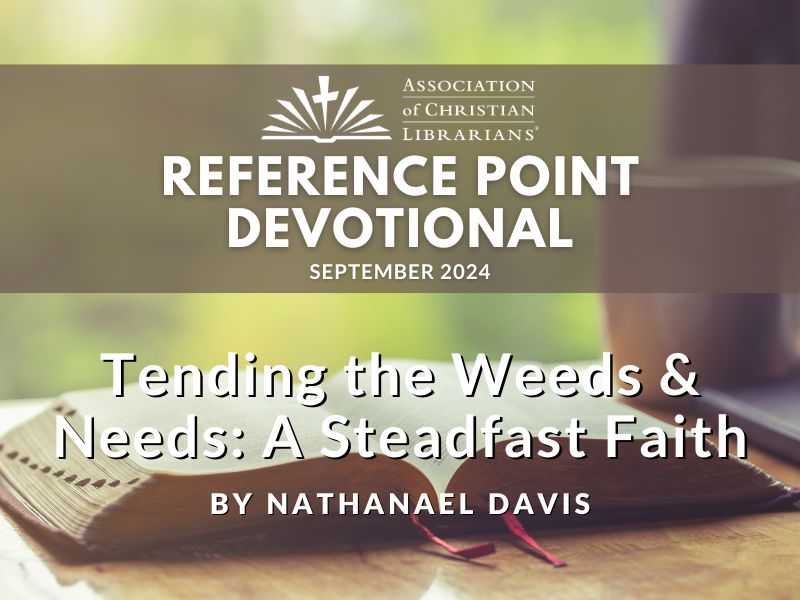Count it all joy, my brothers, when you meet trials of various kinds, for you know that the testing of your faith produces steadfastness. And let steadfastness have its full effect, that you may be perfect and complete, lacking nothing. (James 1:2-4 ESV)
In the late days of summer, I am often preoccupied by two thoughts: the prospect of a new academic year, and the condition of my garden. The first is a perennial condition of the academic library vocation, and the latter is a personal antidote to the condition of the former. As a gardener and librarian, I find that steadfast endurance is a requisite commitment I make to any hope of ever seeing the fruit of my labor. Just as weeds of the garden inevitably crop up and crowd for space, so too are the unexpected needs of the patron on the well-crafted academic schedule. Each requires tending. James (1:2-3) reminds us that our faith is no different. We will “encounter trials of various kinds” and the “testing of our faith produces steadfastness”. It’s a reminder that the greatest return on our service investment, regardless of occupation, is not in the lofty or grand moments, but in the mundane, everyday obligation of tending the weeds and needs. Truly, in moments of great trial, a resilient faith is required, but the measure of our resilience comes only with the sharpened practice of steadfast endurance in everyday adversity. The daily grind, it turns out, has purpose far beyond the paycheck or of vocational awe.
James 1:4 (ESV) reads, “let steadfastness have its full effect, that you may be perfect and complete, lacking in nothing”. Complete!? Lacking nothing? What do you mean, James? The back of the seed package said 10 days to germinate, 50 days to harvest. Yet, late in the high heat of summer, amidst weeds, worms, and other wild neighbors clamoring for a piece of the garden, my effort to faithfully tend wears down any sensibility to endure with patience the long awaited fruit of the labor. The excitement of a new academic year, like the high ambitions of the springtime gardener, are quickly tempered by the endurance of many long hours waiting for the vision of Eden to appear. What project or initiative seemed reasonable at the start, now weighs on our minds late into the year like a trouble too far. The answer to the question of why we endure in faith is far simpler and prescient: in suffering, there is blessing.
Just as James begins his letter with a call to steadfast faith, he ends his letter with the outworking hope of the same. “Behold, we consider those blessed who remained steadfast. You have heard of the steadfastness of Job, and you have seen the purpose of the Lord, how the Lord is compassionate and merciful” (James 5:11). Was it not for Job’s greater blessing (Job 42:12) that he endured such hardship? Like the steadfast need to tend and keep the garden, be steadfast in your endurance with each patron. For by your steadfast commitment to tend and teach even the most wayward freshman student, unsure of their surroundings and full of urgent needs, will soon find themselves settling into their new home. God uses such diligence to water, nurture, and care; he will raise up the next student advocate or worker as an aid to the needs of the library garden. James (5:13) exhorts: when we experience suffering, pray!; when we experience joy, sing praise! If only to better understand the glory of God, and his blessing, compassion, and mercy in the journey along the way, remain steadfast in your faith.

Nathanael Davis
Nathanael is the STEM/Business Librarian and Assistant Professor of Library Science at Cedarville University. He also serves in ACL as the Technology Coordinator on the Conference Coordinating Team. He has been an ACL member since 2020.


